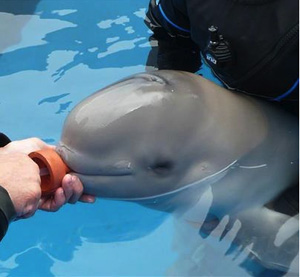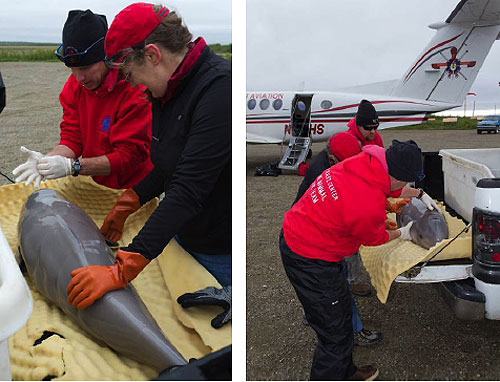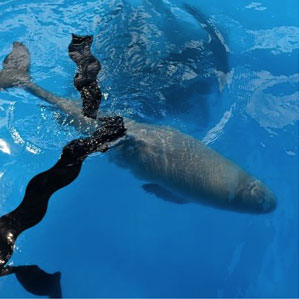
Beluga Whale Calf Rescued by the Alaska SeaLife Center
July 06, 2012
Monday marked the two week point since the beluga calf's was admitted to the ASLC's rehabilitation center. The calf was spending a lot of time seeking attention from his caretakers Monday and it was noted that he loves to be rubbed all over and swim in between his caregivers' legs. The solitary animal estimated at two to three days old, was found near the Diamond O Cannery in Naknek Monday, June 18. The calf was first spotted after a large storm, and no other beluga whales were observed in the immediate vicinity. The animal repeatedly returned to shore after being encouraged to return to the open ocean. It was picked up after rescuers called the Alaska SeaLife Center, who received authorization from the National Oceanic and Atmospheric Administration (NOAA) to attempt a rescue. With support from Georgia Aquarium, three Alaska SeaLife Center staff flew on a Grant Aviation aircraft from Seward to South Naknek airport to retrieve the calf. “Grant Aviation delayed scheduled flights to enable this rescue to occur, and we thank them for their fast response and accommodation to the special needs of transporting a beluga whale,” said Tim Lebling, stranding coordinator. While the Center was designed with pools capable of holding belugas, this calf is the first beluga whale to ever be housed at the Alaska SeaLife Center. When the 5-foot long calf was brought to the Center, it weighed 50 kilograms (110 pounds). The calf is currently being fed every two hours with a milk matrix created specifically for beluga calves, which contains all of the nutrients and calories the calf needs to grow. The calf's current weight is 116 pounds. Thursday, it was reported that the calf's suckling has been progressing quite a bit lately. On Wednesday, the calf got 1/3 of his total daily formula from the bottle. The calf is still being tube fed regularly in order to meet his caloric needs. To date, the baby beluga has not been given a name.
Beluga whale calf physical exam at the time of its rescue at South Naknek Airport
“The calf is swimming on his own, cooperating with feedings, and breathing regularly, which are all very positive signs. However, there are tremendous hurdles ahead. Because this animal is extremely young, it is at a very high risk of complications,” said Dr. Carrie Goertz, staff veterinarian. Beluga whales exist in five distinct stocks in Alaska. This calf is from the Bristol Bay stock, a population that appears to be growing and is geographically distinct from the endangered Cook Inlet beluga whale stock. Federal and state funding sources are insufficient to maintain the stranding program at ASLC. It's running about $2,000 a day to care for the calf, Alaska SeaLife Center President and CEO, Tara Riemer Jones told SitNews today. That does not include the cost of the visiting marine mammal specialists. If the calf survives, he'll never see the open ocean again since there is no way now for humans to teach him survival skills. The Alaska SeaLife Center is the only permanent marine rehabilitation center in Alaska, responding to stranded wildlife such as sea otters, harbor seals, and whales. The stranding program responds to beluga whales with the authorization of NOAA. Once a stranded marine mammal is admitted to the ASLC, it receives care from our experienced and dedicated veterinary and animal care staff.
“We rely on donations and private grants to enable us to respond to stranded animals like this beluga whale calf. We especially thank Shell Exploration and Production, as well as ConocoPhillips Alaska, for their generous contributions to the Center in support of wildlife rescue,” said Jones. The ASLC Rescue and Rehabilitation Program is authorized by NMFS (National Marine Fisheries Service) and USFWS (U.S. Fish and Wildlife Service) to respond to marine mammal and bird strandings from the entire gulf coast of Alaska. The program includes a veterinary staff, interns, and volunteers trained to respond and care for marine mammals and birds. The Alaska SeaLife Center is an accredited member of the Association of Zoos and Aquariums and the Alliance of Marine Mammal Parks and Aquariums. The National Marine Fisheries Service will eventually decide where he will be placed. The Alaska SeaLife Center operates a 24-hour hotline for the public to report stranded marine mammals or birds, and encourages people who have found a stranded or sick marine animal to avoid touching or approaching the animal; instead, those individuals should call 1-888-774-SEAL (7325).
On the Web:
Source of News & Photographs:
E-mail your news &
photos to editor@sitnews.us
|
||||


